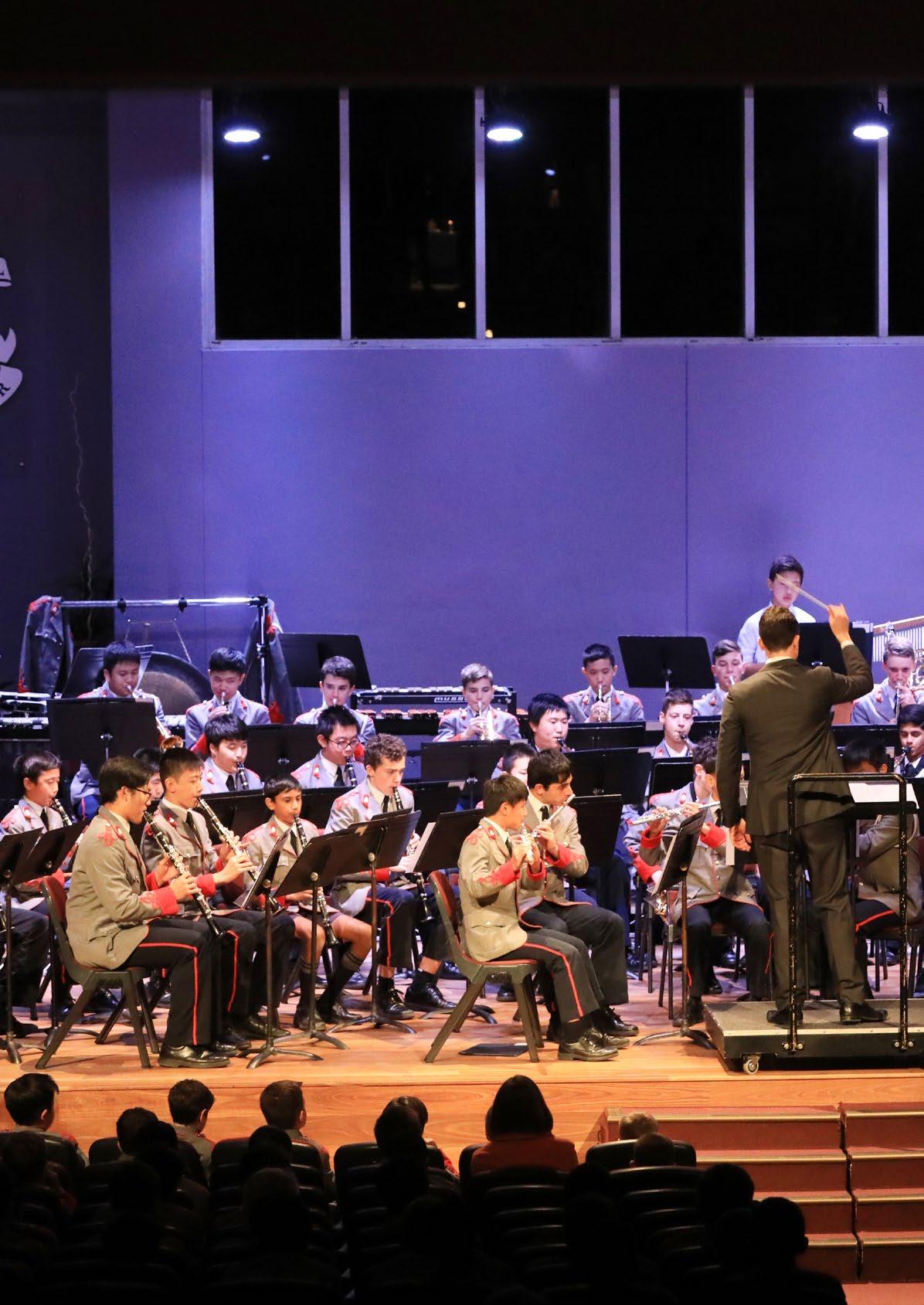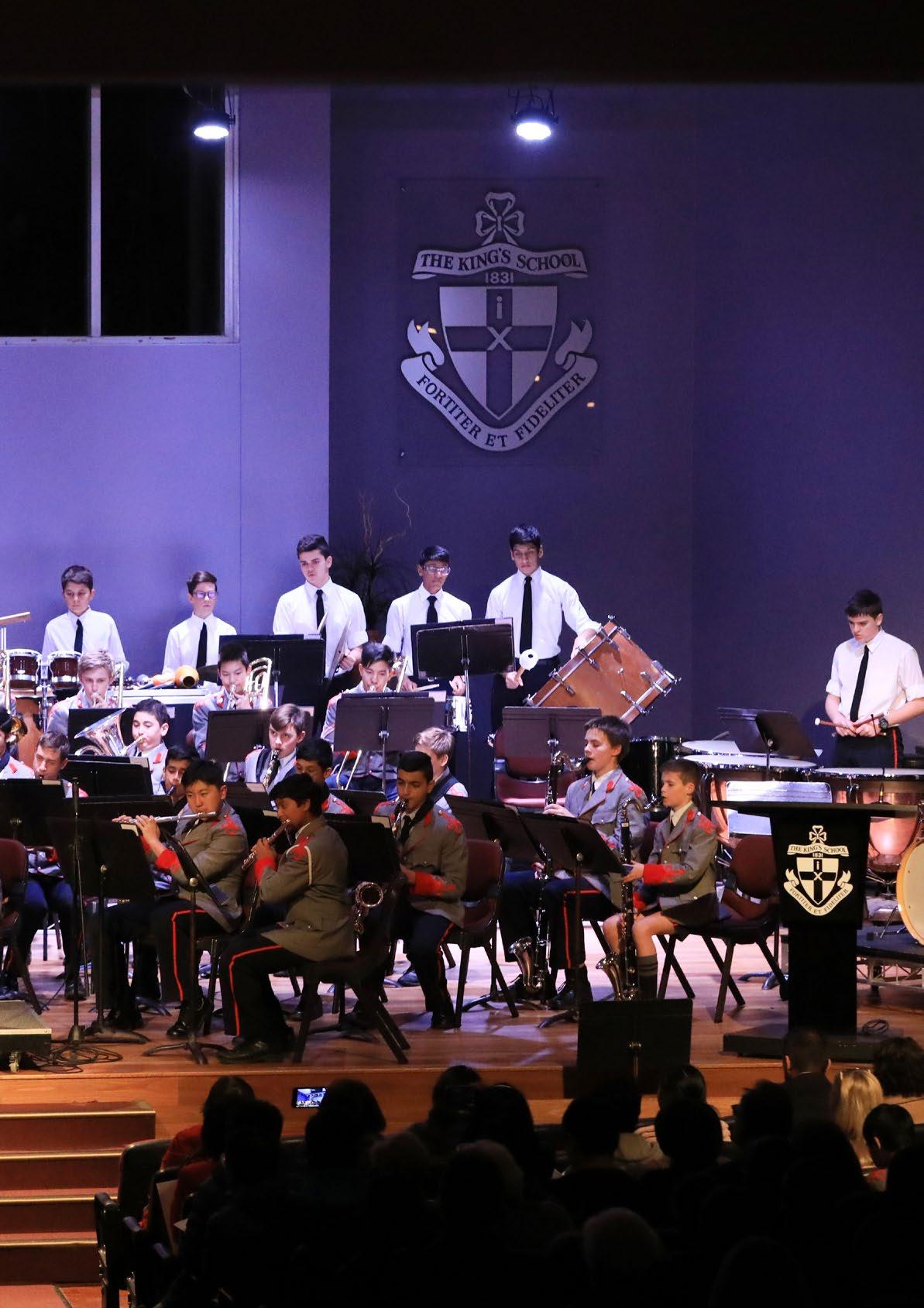Music Information Handbook
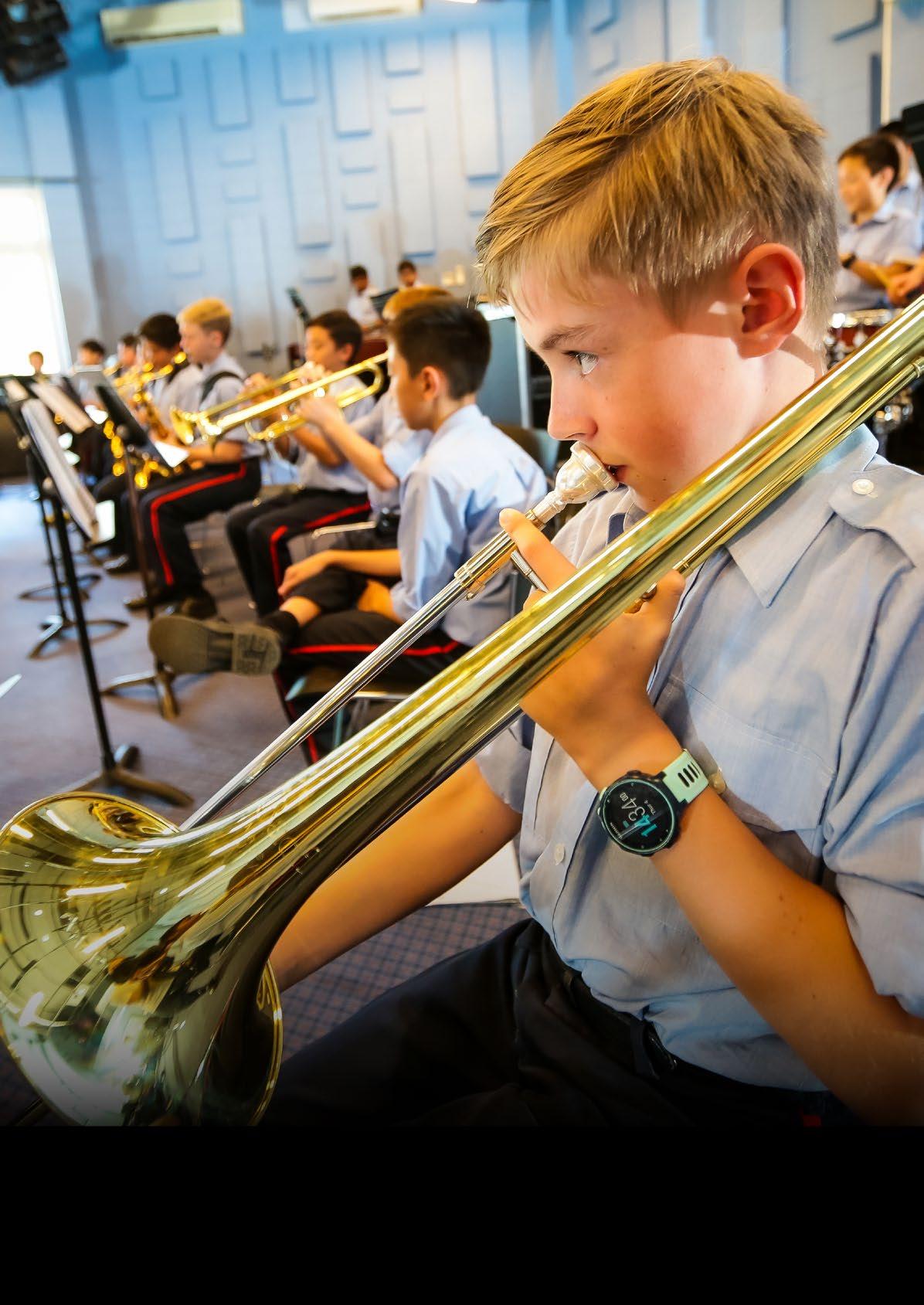


Music is woven through the experience of every boy at King’s. By the end of his time at the School he will, at the very least, have completed 100 hours of compulsory classroom tuition, have sung in chapel services and have heard performances in assemblies by school and visiting musicians.
He may have sung in the School choir or have been part of a musical production in the theatre. He may have learned a musical instrument and played solo, or been part of one of the School’s many ensembles. He may have elected to take music as a school subject (between Years 8-12).

The experiencing, the participation in and the understanding of music, as with all of the arts, leads to a cultural awakening, a unique insight into history and an exploration of the feelings and emotions of ourselves and others. Music making involves team-work, self-reliance and self-discipline, as well as preparation and concentration.
When music is created in this way, the human response is one of deep fulfillment, an appreciation of beauty and inspiration which is beyond the physical and tangible.
The music program at King’s aims to provide opportunities for experience and participation in music at whatever level a boy feels inclined to involve himself. Further, it endeavours to equip musicians with skills that will provide a lifetime of enjoyment.
Sarah Feltham Head of Music“
When music is created in this way, the human response is one of deep fulfillment, an appreciation of beauty and inspiration which is beyond the physical and tangible.
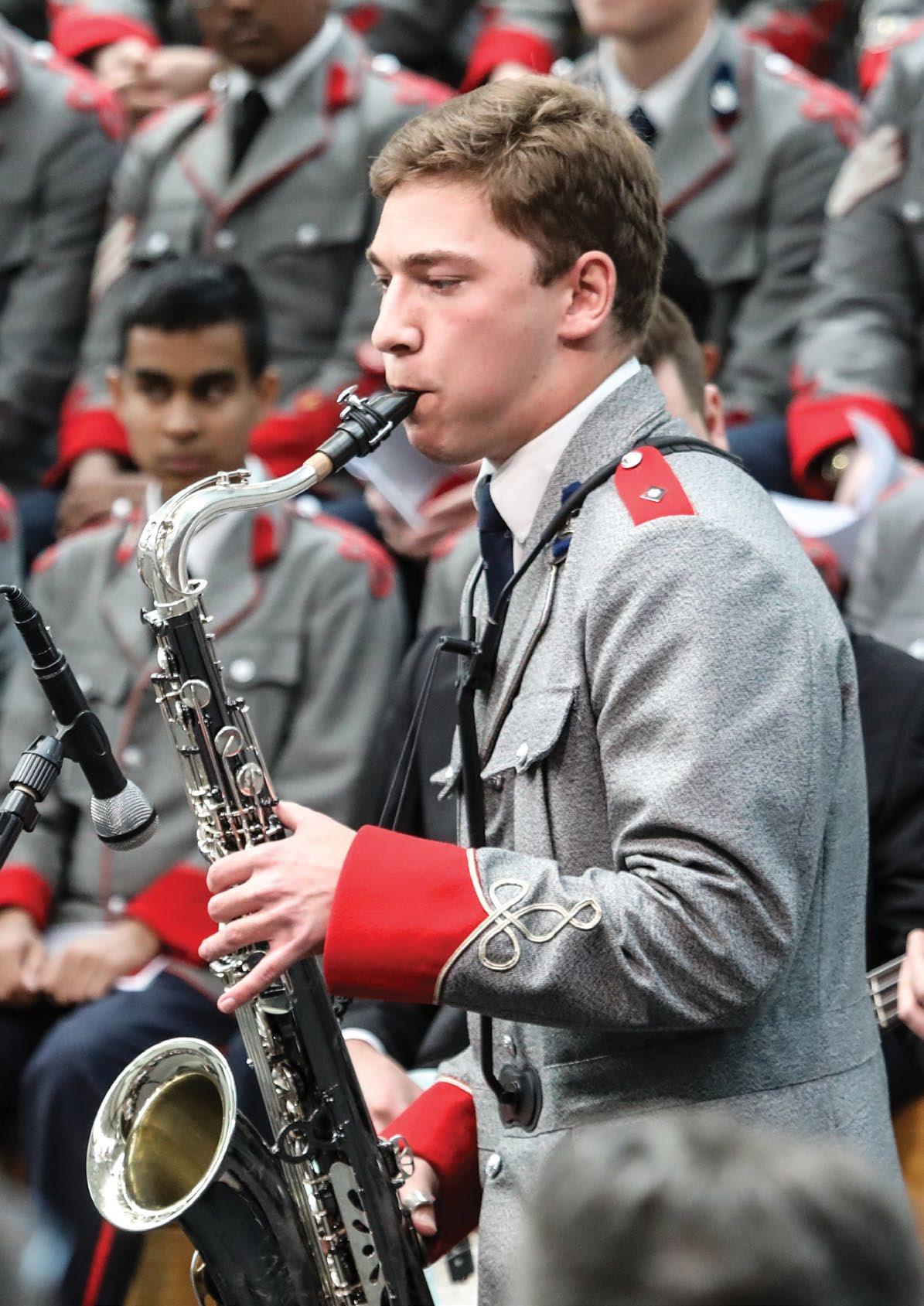

is participatory integrates listening, performing (singing and playing), composing promotes both individual and social aspects of music-making develops creative thinking assists in the development of the whole person (sensory, physical, intellectual, personal, emotional, cultural, and sense of community) is fun and challenging
A calendar of events for the year is provided on Canvas for all parents and students involved in music, outlining all commitments for the year. It is very important that information in the calendar be noticed and recorded, so that clashes and difficulties do not arise for the boys.
The calendar will indicate all Student Recital Evenings, Band / String / Choral Concerts, Master Series, as well as Meet the Music (Sydney Symphony Orchestra) excursions, but may exclude events organised separately by studio teachers.

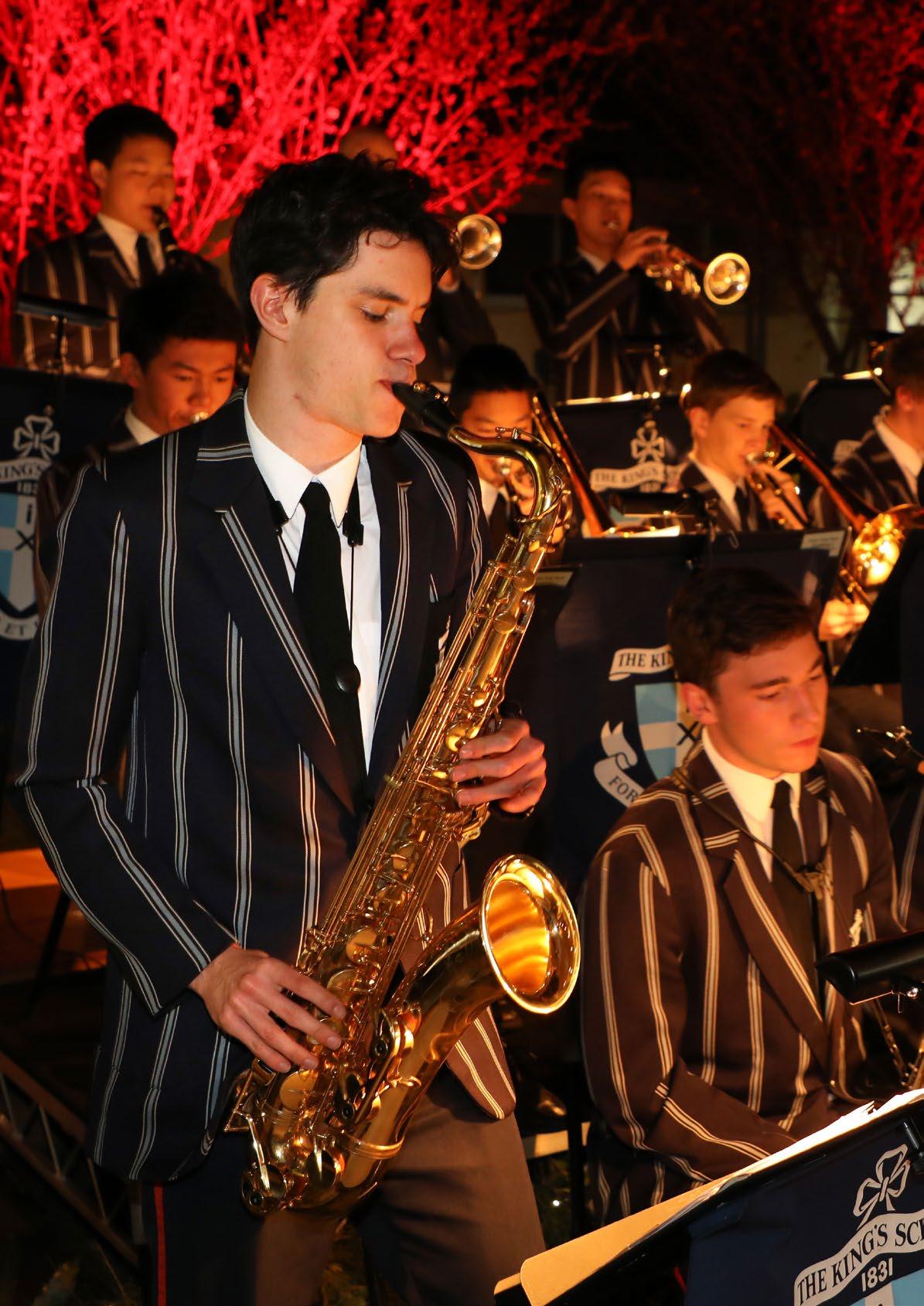
The Senior School class music curriculum is divided into two courses in each of which four concepts are experienced: Performance, Composing, Listening, Musicology and Aural.
The 100 hour, Year 7–10 course which is mandatory for all children in the state is completed during Year 7 at King’s. This enables the course to be experienced before prejudices begin, and before adolescence, with all of its preoccupations.
A wide range of styles and varieties of music is experienced during the course. During the year, boys will experience other composers’ music by performing it, learning to read it and listening to it, both at concerts given during classes by visiting artists, in classroom activities and in singing as a Year group. Class time is spent each week at the computer learning to manipulate the musical vocabulary boys inject into their own simple compositions, and also learning to identify sounds and rhythms - enhancing their aural imaginations. As well, their vocal skills will be developed through an intensive vocal training program.
As with other subjects, boys can elect from the beginning of Year 8 to study Music as an examinable subject. The course is a continuation and intensification of what has come before, and is taken by those boys who have a specific interest in all aspects of music. It continues until the end of Year 10 and may then be taken on to the Higher School Certificate.
At the end of Year 6, students will be encouraged to apply for acceptance into the Year 7 Music Enrichment Stream, as an option to the Year 7 Mandatory Music Program. Boys with significant Musical backgrounds will be given the opportunity to develop advanced musical skills in this course building upon their existing musical experience and knowledge, and extending them according to their own unique abilities. Boys of like-mind and musical interest will be taught in an orchestral and choral setting, with their instruments ‘in hand’. The program will: encourage service to the community; champion solo and ensemble participation; and focus on the development of musical excellence in performance, composition, and musicology.
A wide range of styles and varieties of music is experienced during the course. During the year, boys will experience other composers’ music by performing it, learning to read it and listening to it.

In the Senior School, boys who are involved in individual music tuition join a program where parents have agreed to pay an additional tuition fee for lessons during class time. Boys come out of school at a particular time each week, and miss a different school lesson each time, on a rotational basis. Each boy then has two responsibilities:
• To organise to make up work missed, and complete work set in class while he is away.
• To ensure that his music lessons are spread so that he will be absent from a wide cross-section of school subjects.
Music Instrumental Lesson diaries are available from the Music School, and Instrumental Teachers will complete a Lesson Log at each lesson if the student / parent desires. The diary is a good way to note the next lesson time, as well as information pertaining to the boy’s progress and practice needs.
There are limited out-of-school lesson times available, however, these are kept for senior boys or for boys who learn two instruments. Not all instrumental teachers are available for lessons outside school hours.

There is a wide range of instruments, as well as voice, taught at King’s: all band and orchestral instruments, guitar (contemporary and classical), piano, pipe organ, drum kit, percussion and singing.
A boy who starts lessons must have daily access to the instrument he is learning.
Here are four considerations:
• It is vital that a boy should like the sound of the instrument he chooses.
• The repertoire for some instruments leans towards jazz and popular music, and for others towards classical music.
• Certain instruments are often in short supply in the various ensembles. A boy may well gain a place earlier should he learn one of these.
• Whatever the choice, a boy must have an instrument for daily practice.
Boys are encouraged to undertake singing lessons at King’s, and will be supported in their pursuit by the Music faculty. Singing can provide lifelong enjoyment and has many flexible options. Huge efforts go into our annual musical – and as a consequence, those boys who have singing tuition are usually better placed for a role in these major productions.
The Music Department offers a hire service for parents of boys who wish to undertake the learning of a musical instrument. A boy beginning tuition may be supplied with an instrument (upon availability) from the School. Parents will be charged a rental fee each term for the instrument. After one year, it is hoped that the boy will have settled into learning his instrument and parents are then encouraged to purchase their own instrument. With large expensive instruments, it is not expected that parents should want to commit to buying for some period of time, in which case, they will be able to rent a School instrument on a longer-term basis.
All boys learning an instrument will be supplied with a padlocked locker in the Music School for storage of their instruments. The locker fee is published on the Instrumental Tutition Form. A boy may have to share his locker, and boys will be charged for one padlock during their time at the school, provided they do not lose it. Lockers should always be kept locked at all times. The locks are of the combination variety. The Director of Music keeps a list of all lock combinations. If an instrument belongs personally to a boy, parents are expected to insure their son’s own instrument under their own contents policy, with provision for transporting the instrument away from home. All School-owned instruments are insured under the School’s policy, however an excess will be charged if the instrument is lost or stolen. The repair of any damage to School instruments will be charged to a boy’s School account.
There are many instrumental ensembles in the School. All boys must attend an appropriate ensemble. For pianists and guitarists and other instrumentalists, choir is the preferred ensemble. Woodwind, brass and percussion players are recruited into the Intermediate Concert Band or the Symphonic Concert Band, and string players become members of the String Orchestra. Membership in the Intermediate and Senior Big Bands is by audition only, and conditional on boys also belonging to one of the two Concert Bands. There are also small ensembles – Vocal, Brass, Saxophone, Clarinet, Flute, Percussion as well as String Quartets Piano Trios and Guitar Ensembles which perform from time to time.
There are two main opportunities for a boy to test himself as a performer:
Concerts are held regularly in the Recital Room of the Music School and Futter Hall for both soloists and ensembles. These concerts take the form of Student Recital Evenings, teachers’ own Studio Recitals, as well as Band, String and Choral Concerts. School assemblies are also occasions when musicians are welcome to play in front of the entire School community.
Ensemble Rehearsal times are posted on the main notice board in the Music School, as well as on the Music Canvas Page.
Each year, opportunities exist for senior boys to be part of a full musical production with Tara in the King’s Theatre, singing solo or in the chorus (or playing in the orchestra/band).
Trinity College London and AMEB examinations are held at the School throughout the year, and all boys learning an instrument or voice are encouraged to participate in these. Written theory examinations are also held at King’s.
Performance occasions and examinations encourage the pursuit of excellence, and provide an evaluation of the work done by the boys, who have been released from classes during the year to pursue their musical studies. Those who excel are presented with their certificates by the Headmaster at School Assemblies. Certain levels of attainment in an instrument or voice may qualify a boy to receive Half/Full Colours or Honours. This is conditional on consistent membership in an appropriate ensemble, and attendance at the scheduled music events.
Each year, opportunities exist for senior boys to be part of a full musical production with Tara in the King’s Theatre, singing solo or in the chorus.
The Music Department has its own accompanist, who accompanies at all concerts, and takes charge of accompaniment requirements during the exam season. Boys must book rehearsal time with him/her prior to their performances.
Many boys are naturally keen to work regularly and systematically, but just as many find it very hard to get organised. For the boarders at school, the music studios are available for practice in the evening (5.30-7.00pm). A similar regimen must exist for day boys at home if progress is to be made. It is essential to have a music stand at home – without one, your son will probably use a chair, and immediately develop posture problems. A regular time and place has to be found for practice. Younger children in the family must not be allowed to interfere with equipment, and parents need to show interest and encouragement, without the whole exercise becoming a cause for disharmony in the home.
If there is pressure for time, it is worth remembering that small amounts of regular practice are much more productive than an hour once a week, the day before a lesson!
The Music School is equipped with a number of fine pianos, including a Steinway Grand, and for those boys studying organ, there are pipe organs (both Pogson designs) in Futter Hall and the Chapel.
Each boy should have a zip bag in which to keep his music. At the end of each lesson, the teacher will issue a record of the lesson and expected practice objectives. This is in addition to any notebook the teacher may require the boy to own. There are also spaces for the times of practice to be recorded and signed for by parents or by the teacher on duty, in the case of boarders.
The Music School welcomes contact from parents at all times about a boy’s progress or wellbeing. Please feel free to get in touch with his teacher or the Director of Music at any time, if you want to be more fully acquainted with what he is studying, or his progress.
• Parent/Guardian of any boy wishing to begin music tuition at the school must fill in and sign the music tuition enrolment form.
• In the Senior school, instrumental lessons are given on a rotational basis during class time.
• Boys have either a 30, 45 or 60 minute lesson both at Prep and Senior school.
• Boys will not miss Chapel or Assemblies for Music lessons.
• The teacher must be informed ahead of time for any planned absences from lessons.
• Lessons will not be given during scheduled exam periods or camps week (in the school diary)
• All teachers will publish their lesson times for their students, at least 1 week in advance
• It is essential that daily practice be done to make progress.
• Lessons may be discontinued if progress is not being made, or for any other reason determined by the Director of Music.
• Four weeks notice must be given in writing for discontinuation of lessons, otherwise fees will be charged for those four weeks. The student may elect to take or forfeit these lessons.
• At the end of each year, it is presumed that a boy will be continuing in the following year unless notification of discontinuation is received by the Music office by the last day of term. Please note, this notification is necessary to provide a smooth transition for Tutors into Term 1 of the new year.
Lessons will be charged for all scheduled lessons, except in the following circumstances:
• Whole-day absences from school (due to illness)
• Absence due to a mandatory school activity
• Absence of the Music Teacher
• Absence with prior and adequate notification to the teacher (see below)
• Any changes to lesson times must be advised to the instrumental music teacher with enough time so that the teacher can reschedule other lessons to fill up the gap created by the absent student (usually at least a day’s prior notice). This includes absence due to medical appointments or any other personal reason.
“
The Music School is equipped with a number of fine pianos, including a Steinway Grand, and for those boys studying organ, there are pipe organs (both Pogson designs) in Futter Hall and the Chapel.
“
Concerts are held regularly in the Recital Room of the Music School and Futter Hall for both soloists and ensembles. School assemblies are also occasions when musicians are welcome to play in front of the entire school community.


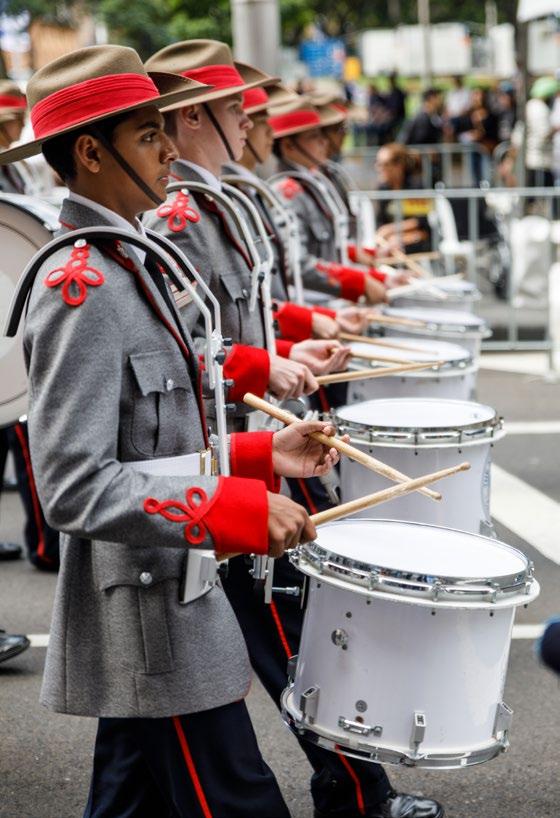
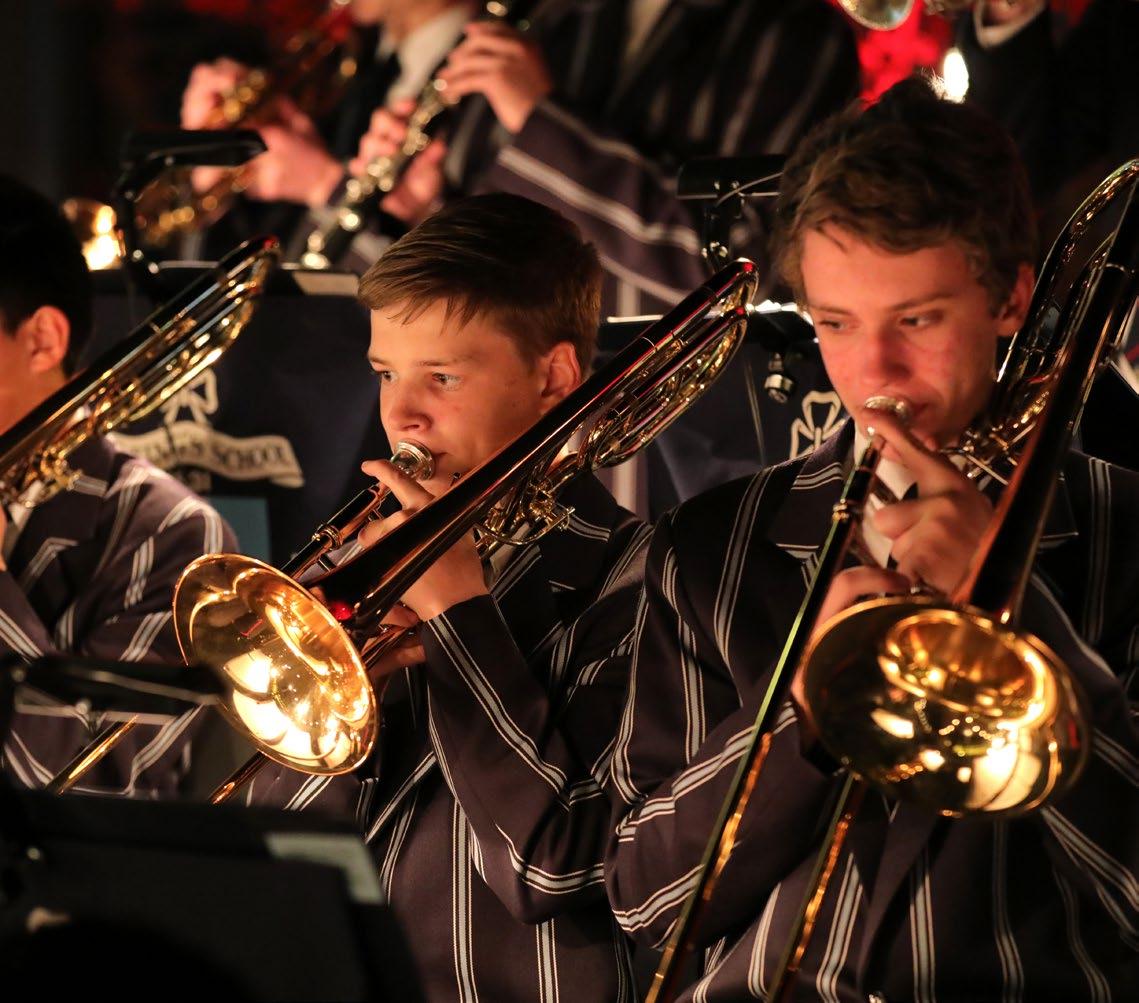


Mrs S Feltham
Head of Music (Academic) and Choir
Mr S Kooper
Head of Music – Preparatory School
T Wilkinson
Head of Woodwind Brass & Percussion
Mr P Taylor
Head of Strings
Dr J Eskenazi School Accompanist
Mr G Burgett
Music Class Teacher
Mrs K Carey
Music Support and Artistic Advisor
Mr J Ford
Music Class Teacher and Choir
Mrs E Vierboom
Music Class Teacher
Administrative Staff
Mrs S Boyton Senior School
Contacting
Telephone (02) 9683 8424
Email music@kings.edu.au
BMusEd (UNSW)
BMusEd
BMus (Performance) MTeach (Secondary)
PhD, MMus, BMus (Hons), LRAM, 1er prix (Paris), ARAM
BMus (Conservatorium), GradDipTeach and Learn (USQ)
BMusEd, AMus, LTCL
BMus Mteach
BA (Syd) DipEd (STC) ASCM (Syd Con) ATA (NESA)
Mr D Bell
Mr G Brown
Ms C Burgoyne
Dr M Choe
Mr A Chubb
Mrs E Clain
Mr J Collins
Mr M Diewald
Mr W Endicott
Mr I Fedotov
Ms C Ghisla
Ms R Graham
Ms E Greenhill
Mr A Grimm
Ms R Grounds
Mr W Hanson
Mr D Henderson
Mr A Hirlian
Ms J Huxtable
Dr H Harrison
Ms E Jardine
Ms M Keogh
Ms J Kim
Ms S Koolhaas
Mr P Koopman
Ms G Lawton
Dr T Leung
Ms J Ling
Ms J Liu
Mr J Ma
Ms R Miller
Mr D Pragnell
Mrs M Sung
Mr L Thatcher
Mr D Vail
Mr C Wagstaff
Mr M Wyborn
Saxophone, Stage Band
BMus Performance (Voice) MMuS Opera, Singing
BMus (Hons), PGDip, Violin
DMA, MM, BMus (Hons), Cello
BMus (Hons), LMusA, LTCL, AMusA (Piano), AMusA (Violin), AMusA (Viola)
BMus, Oboe
Percussion, Drums
Bmus, Amus Classical Guitar
Trumpet
BMus, Clarinet and Saxophone
MMus, Bmus, Violin
Prof Dip RAM and BA Hons (Open) Cello
Violin
Bmus Perf.
MMus, BA, DipMus, Flute
Double Bass
Trumpet
Bmus Jazz Perf.
BA,AmusA Flute, LTCL Flute ATCL Recorder
Composer in Residence
Violin
BMus, DipMus, GradDipMus, DipBus, Clarinet, Saxophone
BMus, LMusA, FTCL, LTCL (Dist), Piano
MMus, LmusA, Cello
Electric Guitar
French Horn and Tenor Horn
DMA, MM, AD, BMus, LMusA, AMusA, Piano, Theory
MNurse, BMus, AMusA, Euphonium, Tuba
BMus, AdvDipOpera, Singing
LTCL, AMusA, M/EngSc/Beng (Hon), Euphonium
BMus Perf, Violin, Viola
Marching Band
Piano, Theory and Accompaniment
MM, BA, Percussion, Drum Kit
Trombone Mmus
BMus (Hons), Organ, Harpsichord, Theory
Dip. Mus (performance) Trombone and Symphonic Band
